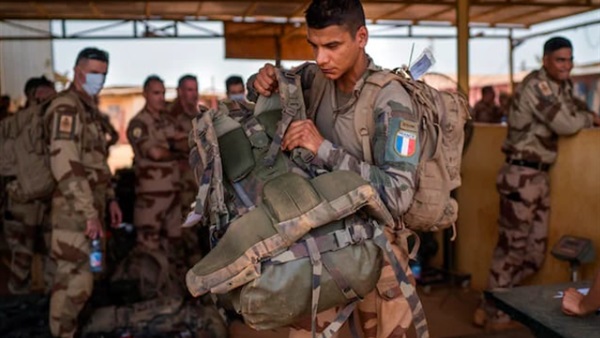France signals intention to pull rest of its troops out of Mali

France is weighing a total military withdrawal from Mali, blaming soured relations with the West African nation’s military rulers and the arrival of Russian mercenaries, according to the European power’s top diplomat and two Western officials with knowledge of the plan.
“If the conditions are no longer in place so that we can act in Mali — which is clearly the case — then we will continue to fight terrorism next door,” French Foreign Minister Jean-Yves Le Drian told France 5 late Monday.
French President Emmanuel Macron plans to announce the departure from Mali this week during a European Union-African Union summit in Brussels, said the officials, who spoke on the condition of anonymity because they were not authorized to discuss the matter publicly.
A spokesperson for the French Foreign Ministry did not immediately respond to questions about whether a withdrawal from Mali was imminent.
Paris — Mali’s biggest defense ally — has about 4,000 troops in West Africa, which is grappling with the world’s fastest-growing Islamist insurgencies. That number is set to shrink to 2,500 this year, and the remaining troops are expected to be redeployed elsewhere in the region, the officials said, including Niger and Ivory Coast.
Leaders have been trading blows for months.
Mali’s junta — led by a special forces officer who seized control of the country in August 2020 — is “illegitimate” and “out of control,” Le Drian said in late January as reports multiplied about Russian mercenaries operating on Malian soil. Days later, Mali gave the French ambassador 72 hours to leave the country.
Le Drian said Monday that 1,000 mercenaries from Russia are now in Mali, which he described as a nation run by “five colonels who have taken power.”
France sent troops to Mali in 2013 to stop al-Qaeda-linked militants from storming the capital, Bamako, after the fighters had seized cities in the north, including storied Timbuktu. After that successful mission, French flags were draped over balconies as people cheered on the foreign soldiers.
But since then, the extremists have regrouped and drilled farther into Mali’s countryside while spilling into neighboring countries. Malians wondered why the French forces in West Africa — which stood at 5,100 last year — could not stop the menace. Some accused the former colonial power of making it worse.
Thousands of West Africans have died, and millions have lost their homes as fighters who claim adherence to extremist al-Qaeda and Islamic State groups have grabbed more territory.
By October 2021, a survey from Malian statistician Sidiki Guindo found that only 26.1 percent of Bamako residents had a “favorable” opinion of France. Earlier this month, video showed protesters in the capital burning cardboard cutouts of the French president.
“We don’t want the French here,” said Yacoube Sangare, a 66-year-old village council member in a region south of Bamako. He was 4 years old when Mali asserted its independence from France. His parents recalled being treated as subjects.
Simmering resentments have burst into rage, he said. People cannot travel far north of Bamako without risking their lives — extremists plant bombs in the roads — and with swaths of farmland cut off, it is hard to put food on the table.
“We blame France for this, and our past leaders for working with them,” Sangare said. “We’re ready for them to leave today.”
The French military footprint in Mali is not beloved in Paris, either: One columnist for the center-left Le Monde newspaper called the situation a “diplomatic and military humiliation.”
“Nine years after its start, the mission in Mali has failed to achieve any of its objectives — to ensure Mali’s integrity and restore the state there, defeat the jihadists and prevent their proliferation in West Africa,” columnist Philippe Bernard wrote.
Last spring, Mali counted its second coup d’etat in nine months as a special forces officer, Col. Assimi Goïta, put himself in charge of the nation of 21 million. Macron condemned the takeover. Three weeks later, Paris announced the gradual withdrawal of troops from West Africa.
A European counterterrorism force called Takuba was supposed to pick up the slack. Now that effort is also at risk: Nearly half of the 800 soldiers deployed are French, and Mali kicked out 100 Danish soldiers who had arrived last month at France’s invitation, citing a lack of paperwork. (Sweden also said it would withdraw troops from Takuba.)
European allies have blasted the late December arrival of “hundreds” of Russian mercenaries. The deployment of such private contractors to Mali “can only further deteriorate the security situation in West Africa,” France and 14 other Western powers said in a joint statement. Russian mercenaries, who have been hired in several African nations, have a track record of human rights abuses, according to a panel of U.N. experts, including extrajudicial killings, forced disappearances and sexual assault.
Mali’s government has denied working with mercenaries, saying that only Russian trainers — “state-to-state” allies — are active in the country. Previously, officials said they courted Moscow’s help because France was leaving.
Russian President Vladimir Putin has contradicted that claim, saying at a news conference with Macron this month that the Kremlin had “nothing to do” with “private” security contractors in Mali.





